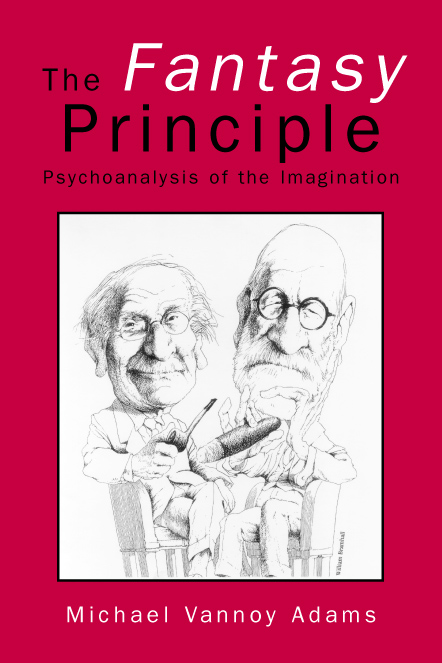The Fantasy Principle
Michael Vannoy Adams
The Fantasy Principle: Psychoanalysis of the Imagination
Hove and New York: Brunner-Routledge, 2004
Buy from amazon.com: Paperback | Hardcover
Read Ginette Paris's and Peter Tatham's book reviews of The Fantasy Principle.

Praise for The Fantasy Principle
- "Michael Vannoy Adams moves the field of psychoanalysis into the 21st century by turning the clock back to the main discovery of Freud and Jung: fantasy rules the psyche. The Fantasy Principle is a major serious researched work and yet a book of imagination and humor. It is also a book aimed beyond professional therapists, engaging everyone who is, will be, or has been in therapy."
- James Hillman
Don't "Get Real." Get Fantastic!
Contemporary psychoanalysis needs less reality and more fantasy. It needs a new principle - what Michael Vannoy Adams calls the "fantasy principle."
Freud insists that we conform to the reality principle. He assumes that there is only one reality and that we all define it in exactly the same way. Reality, however, is not given. There are many "realities," and they are constructed from fantasies that occur in us continuously. Fantasy, Adams declares, is what transforms consciousness.
What is so distinctive about this book is how radically it affirms the centrality of the imagination.
Adams challenges us to exercise and explore the imagination. He shows us how to value vitally important images that emerge from the unconscious, how to evoke such images, and how to engage them decisively. He shows us how to apply special Jungian techniques to interpret images accurately and to experience images immediately and intimately through what Jung calls "active imagination."
Adams argues for the recognition of a new school of psychoanalysis - the school of "imaginal psychology." As Jung says, "Image is psyche." Other schools of psychoanalysis emphasize drives, the ego, object relations, the self, and so forth. In contrast, the school of imaginal psychology emphasizes the transformative impact of images.
Table of Contents
- The Fantasy Principle: Imaginal Psychology and the Dethroning of "Mr. Reality"
- Compensation in the Service of Individuation: Phenomenological Essentialism and Jungian Dream Interpretation
- Jungian Post-Structural Theory: Structures versus Constructs, Concepts versus Images
- Mythological Knowledge: Just How Important Is It in Jungian (and Freudian) Analysis?
- The "Womanning" of Schreber: Catastrophe, Creation, and the Mythopoeic Forces of Mankind
- Dreaming of the Ku Klux Klan: "Race," History, and Culture in Psychoanalysis
- Jung, Africa, and the "Geopathology" of Europe: Psychic Place and Displacement
- Refathering Psychoanalysis, Deliteralizing Hillman: Imaginal Therapy, Individual and Cultural
- A Baby Is Being Eaten: A Case of Cannibalistic Malpractice and Suicide
- The Importance of Being Blasphemous: Profanation versus Resacralization